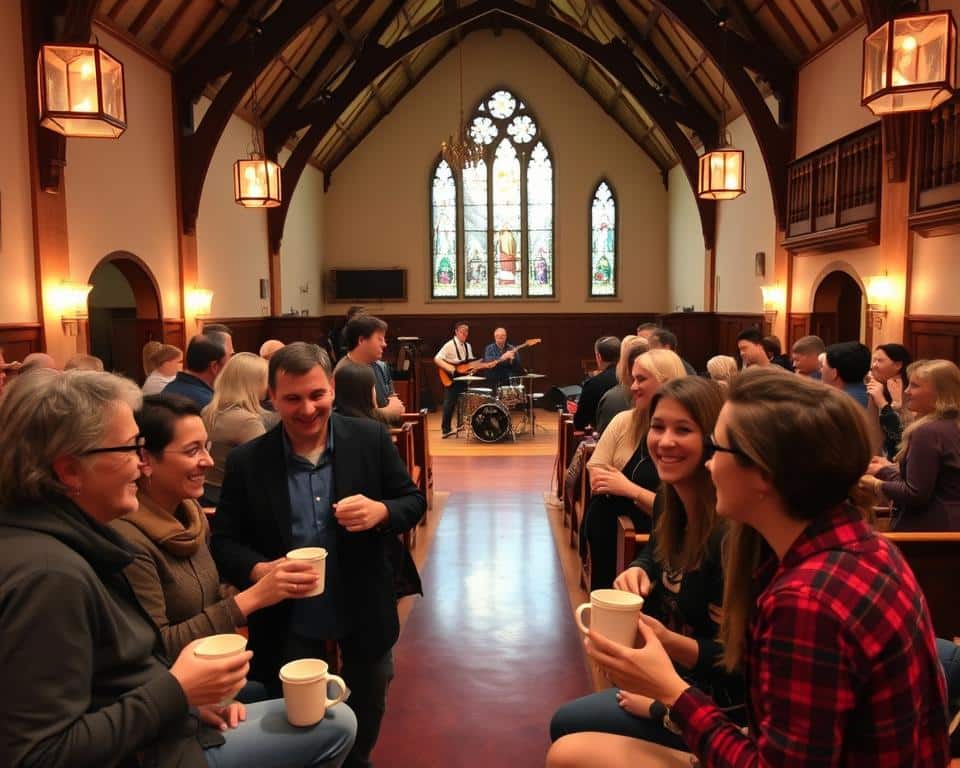Do you long for deeper connections with others who share your faith? A strong community provides more than friendship—it strengthens your walk with Christ. Studies show 27% of people feel lonely, but God’s word offers a better way.
Galatians 6:2 reminds us to “carry each other’s burdens.” When members unite in truth and love, they create a sense of belonging. This guide shares practical steps, rooted in Seventh-day Adventist principles, to help you foster meaningful relationships.
You’ll discover how faith-based groups combat isolation and nurture hope. Let’s explore how to grow together in God’s purpose.
Establish a Core Foundation for Your Community
Every lasting Christian fellowship starts with a solid foundation. Like the early church in Acts 2:42–47, your group needs shared values, committed people, and a clear mission. This groundwork ensures growth and unity.

Define Shared Values Based on God’s Word
Scripture must guide your group’s identity. Philippians 2:3–4 reminds us to value others above ourselves. Draft a covenant outlining biblical expectations—like honesty, humility, and love.
Surveys help align everyone’s understanding. Ask: “What truths from Ecclesiastes 4:9–12 inspire our purpose?” Write these values down and revisit them often.
Identify 5–10 Committed Founding Members
Start small. Research shows 10 curated members set the tone for healthy communities. Choose those who serve selflessly and reflect Christ’s character.
Assign roles based on spiritual gifts (Romans 12:6–8). One might lead prayer, another organize service projects. OpenSauced’s method for tracking contributions can help measure impact.
Create a Clear Purpose Statement
A purpose statement answers, “Why do we exist?” Use Scripture like Matthew 28:19–20 to frame your mission. For example: “To grow in faith and serve our neighbors.”
Host prayer meetings to refine this vision. Product Hunt’s founder built his core group through intentional gatherings—follow that model.
“Two are better than one… A cord of three strands is not quickly broken.”
Finally, establish accountability. Regular check-ins keep the core group focused. When everyone works toward shared goals, God’s ideas flourish.
Integrate Biblical Principles into Daily Practices
Living out faith means weaving Scripture into everyday choices. Strong communities thrive when God’s truth shapes routines. Research shows 72% of thriving groups use regular rituals—like prayer or service—to deepen connections.

Use Scripture as a Guide for Decision-Making
Proverbs 3:5-6 offers clarity: “Trust in the Lord with all your heart.” Apply this by hosting weekly Bible studies with practical takeaways. For conflicts, ask, “What would Jesus do?” and let truth lead the way.
Try daily devotional check-ins via messaging apps. Share verses that inspire your week. OpenSauced’s #100DaysOfOSS challenge proves small, consistent actions build trust.
Prioritize Prayer and Worship Gatherings
Prayer chains for urgent needs unite people quickly. Track requests in shared calendars and celebrate answered prayers together. Jesus modeled this in Mark 1:35—rising early to pray.
Weekly worship nights foster a sense of awe. Sing, read Psalms, and reflect. One group saw 40% deeper engagement after adding monthly praise circles.
“Your word is a lamp for my feet, a light on my path.”
Encourage Service as an Expression of Faith
Organize neighborhood projects monthly—food drives, yard cleanups. Match tasks to members’ gifts. A tech-savvy person might manage sign-ups, while others cook meals.
Service strengthens community bonds. As Acts 20:35 says, “It is more blessed to give.” Start small: Visit a nursing home or write encouragement cards.
Foster Trust and Open Communication
Trust transforms groups into families—here’s how to nurture it. Research shows voice calls create stronger relationships than texts. When members feel safe to share, growth happens. Start with these steps.
Host Small Group Discussions for Vulnerability
Break into groups of 4–6 for deeper sharing. Use Zoom breakout rooms for privacy. Ask questions like, “How has God helped you this week?”
Washington State University found small groups reduce social anxiety. This builds trust over time. Share personal stories—it invites others to do the same.
Address Conflicts with Grace and Truth
68% of conflicts resolve faster with structured processes. Follow Matthew 18:15–17:
- Speak one-on-one first (“Grace First” model).
- Use “I statements” (“I felt hurt when…”).
- Bring neutral leaders if needed.
Train leaders in nonviolent communication. Document guidelines in a handbook for clarity.
“Everyone should be quick to listen, slow to speak, and slow to become angry.”
Practice Active Listening Without Judgment
Repeat what you hear before responding. Nod or say, “I understand.” OpenSauced’s triage team uses this to improve feedback loops.
Schedule quarterly check-ins. Ask, “How can we support you better?” This shows care and strengthens bonds.
When you prioritize trust, your group becomes a safe harbor. Try one tip this week and watch relationships deepen.
Organize Meaningful Events and Activities
Events shape strong groups by giving people shared memories and purpose. Research shows communities with regular gatherings retain 60% more members. Whether it’s meals, service, or celebrations, intentional time together deepens faith and joy.
Plan Fellowship Dinners With Purpose
Themed potlucks with devotionals blend food and faith. Try monthly themes like “Harvest of Gratitude” or “Love in Action.” Assign dishes tied to Scripture—loaves and fish for John 6:1–14.
Shared meals boost bonding by 33%. Use these tips:
- Rotate hosts to share responsibility.
- Include icebreakers: “Share a verse that encouraged you this week.”
- Close with prayer circles for local needs.
Coordinate Volunteer Opportunities
Service projects turn faith into action. Partner with food banks or shelters quarterly. Track sign-ups via tools like Eventbrite—Product Hunt’s brunch-to-platform model started this way.
Create an annual calendar with local partners. Match tasks to gifts:
- Organizers manage logistics.
- Encouragers write thank-you notes.
- Artists design outreach materials.
“Let us not love with words but with actions.”
Celebrate Milestones and Testimonies
Recognize baptisms, anniversaries, or answered prayers. Develop a template for sharing stories:
- What God taught you.
- Scriptures that guided you.
- How the group supported you.
Record testimonies for your archives. Host quarterly retreats to reflect and plan. When you celebrate God’s work, hope multiplies.
Develop Servant Leaders Within the Community
Strong communities thrive when members step up to lead with humility. Research shows mentored members have 50% higher retention. By investing in leadership, you create a ripple effect of growth at every level.
Train Members to Mentor Others
Use the Paul-Timothy model (2 Timothy 2:2) to pair experienced core leaders with newcomers. Host quarterly workshops to teach active listening and Scripture-based guidance.
Shadowing opportunities let aspiring leaders learn by doing. Track progress with tools like OpenSauced’s contributor insights. This builds confidence and skills.
Delegate Responsibilities Based on Gifts
85% of leaders emerge through delegated tasks. Start with spiritual gifts assessments. Match roles to strengths:
- Encouragers lead prayer teams.
- Organizers manage event logistics.
- Teachers guide Bible studies.
Rotate roles yearly to develop well-rounded members. This ensures everyone has a part to play.
“Equip his people for works of service, so that the body of Christ may be built up.”
Model Christ-Like Leadership
Jesus washed feet to show servant leadership (John 13:14–15). Follow His example by:
- Hosting annual appreciation events for volunteers.
- Creating crisis response teams for urgent needs.
- Sharing leadership stories in newsletters.
When core leaders serve first, others follow. Try one action this week to empower your community.
Commit to Long-Term Growth and Support
Healthy groups thrive when they plan ahead. Tracking progress and adapting ensures lasting success. Research shows communities measuring key metrics grow three times faster. Start with these steps to strengthen your network.
Annual spiritual health assessments reveal areas for improvement. Use tools like SurveyMonkey to gather honest insights. Pair this with quarterly strategy retreats to align on goals. Document lessons learned to guide future decisions.
Develop a five-year vision document to clarify direction. Include growth targets, outreach plans, and leadership pipelines. Partner with other faith groups to share resources and wisdom. This builds resilience through shared learning.
Prepare for challenges with a crisis management team. Train leaders in conflict resolution and urgent response. OpenSauced’s insights show structured planning prevents burnout. Celebrate milestones to keep hope alive.
Your group’s success depends on intentional care. When you invest in long-term health, God multiplies the impact. Start small—pick one action this month to strengthen your business of faith.





